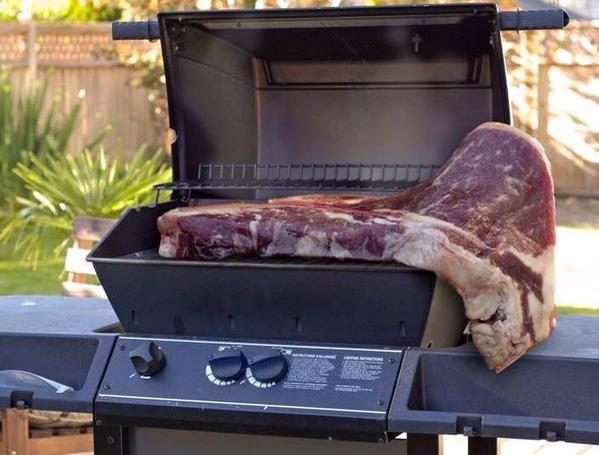I went to the grocery store the other day, and there was a lady in the produce section looking at apples.
She was with her friends – probably about 41 or 42 years old – and was explaining to them the importance of carbohydrates and how they’re great for fat loss.
She explained that “carbs are great for building muscle, and more muscle equates to a faster metabolism.”
She then went on to say “carbs keep you full,” and “are much more satiating than anything else you eat in your daily diet.”
Finally, she told them “If you want to lose body fat, you need to eat more carbohydrates. Protein on the other hand…that stuff will make you fat.”
Uh…WHAT?
First off, I think it’s fantastic that she’s trying to get her friends to eat apples.
Regardless of the explanation she’s giving as to why they should be eating those apples, if they end up eating more apples – as opposed to more pop-tarts, golden grahams, or heavily frosted animal crackers (yeah, adults eat that stuff too)– I’d consider that a victory.
Also, she’s not 100% wrong in everything she said.
More muscle does equate to a faster metabolism (muscle tissue requires more energy to maintain than fat tissue), and carbs – some carbs, not all of the processed, sugary ones – do keep you full.
But, the rest of what she said?
The part about carbs being great for muscle growth?
The part about carbs being the most satiating macronutrient?
The part about protein making you fat?
Yeah, none of that mess is true.
In fact, PROTEIN is the most essential nutrient when it comes to building muscle mass.
PROTEIN is the most satiating macronutrient you eat in your daily diet.
And PROTEIN is the least likely of the three macronutrients to lead to excess fat storage.
Hey, the intention was good, but the information – as a whole – was pretty bad.
And if you want to lose body fat, you need – well, should – place an emphasis on eating protein.
Muscle and a Higher Food Intake
Like we just touched on, it’s protein that contributes to muscle growth, not carbohydrates.
The more muscle you have, the faster your metabolism.
And the faster your metabolism, the higher potential for fat loss you have in the long run.
But, with that being said, it’s important to note that muscle GROWTH only takes place during a mass gain phase (unless you’re a beginner or someone coming back from a long lay-off).
The chance of you building new tissue during a fat loss phase is pretty slim, but…that doesn’t mean you shouldn’t still eat ample amounts of protein because where protein allows you to build new muscle tissue, it also allows you to retain the muscle tissue that you already have.
And, this is important for two reasons:
- It allows you to maintain a higher food intake while still stimulating fat loss.
- It allows you to maintain a well-developed physique.
I don’t know about you, but I have a much greater chance of achieving my fat loss goals if I start a diet on 2500 calories as opposed to 1500 calories.
My energy will be higher.
I can still eat a lot of my favorite foods (in moderation, which you should be doing anyway).
And the suckiness of the diet will be, well, a lot less sucky.
On that same note, when I finally do get down to the body fat that I’m striving for, I want to look like I actually lift.
I don’t want to end up skinny-fat, where I’m at a low body fat but don’t look like it because I don’t have enough muscle to fill out my physique.
That would freaking suck (all that hard work for nothing).
Maintaining a higher food intake?
Maintaining your current level of lean body mass?
Yeah, they’re both pretty important.
And, aside from training your ass off in the weight room, the best way to do that is to eat ample amounts of protein.
Satiation, the Fat Loss X Factor
You want to know what separates a successful dieter from one who’s not successful (aside from effort and being able to display that effort on a consistent basis)?
Satiation.
Or, in other words, how long they can stay full on a daily basis.
Because, when it comes to losing body fat, you’re going to be hungry.
Maybe not all the time (hopefully not all the time), and maybe not to the point of not being able to focus on anything else, but you will be hungry.
And, the problem with being hungry is it causes you to make poor decisions (choosing fast food over a home cooked meal for example because you’re “too hungry” to spend the extra time cooking).
It causes you to overeat (My meal size and eating speed increase dramatically when I’m hungry).
It makes you angry (or at least, it makes me angry).
And it causes a lot of people to give up because most of us don’t do well with being hungry – legitimately hungry, not just bored or thirsty – on a regular basis (we’re pretty damn spoiled).
Being hungry…it’s the bane of a dieter’s existence and something you want to avoid at all costs.
And how do you avoid it?
Aside from not dropping your calories too low – which probably isn’t a good idea in any normal situation (try to keep calories as high as possible while still stimulating fat loss) – you avoid it by eating a good amount of protein.
Protein Probably Won’t Make You Fat
Protein has a high thermic effect of food, which is just a fancy way of saying “it takes a good amount of energy to digest it.”
How much energy?
About 30% of its total calories.
Which means if you were to eat 200 calories worth of chicken breast, 60 of those calories would probably be “burned up” in digestion.
Plus, protein is hard to overeat.
This goes back to the whole satiation thing.
The chance of you overeating protein is pretty darn slim.
But, it can be done (make no mistake, you CAN eat too much protein), and let’s say you do go overboard to the point of putting yourself in a caloric surplus.
I don’t have the exact study on hand, but I remember reading something where participants ate about 1000 calories over their maintenance caloric intake of nothing but protein, and although they gained 3-4 lbs by the end of the study, they hadn’t gained any fat tissue.
Now, I don’t know if that was accurate.
And I don’t know if the test subjects and/or the experiment were a good representation of you and I.
But, it is interesting, and something that very well seems plausible given the nature of protein and what it does inside the body.
I’m not saying you should overeat protein.
Seriously, that’s not at all what I’m trying to get across.
But, if you are gonna overeat something, protein would probably be the way to go.
Alright, You’ve Sold Us, We Need to Eat More Protein…So How Much?
About 1g per pound of body weight.
Maybe a little more, maybe a little less.
1g per pound of body weight makes things simple and is in between the low end and high end of the range of what’s thought of as acceptable (.8-1.5g per pound of body weight).
You don’t want to eat too much protein.
If you do you’ll start taking away from the other macronutrients (carbs and fats are important too).
But, you also don’t want to eat too little protein.
Doing so would mean losing out on all of the benefits we just spent this entire article discussing.
The key?
Set your protein intake at about 1g per pound of body weight, and don’t change it.
Then, as you begin losing body fat, start chipping away at carbs and/or fats until you’ve reached your goal.
^^Fat loss is MUCH more complex than that, and nutrition is NOT a math equation. This is just an extremely simplified way to look at the nutritional component (specifically related to macronutrients) of fat loss.
Like What You See?
Get the Smoot Fitness Guide to Getting Stronger - FREE.


Leave a Reply